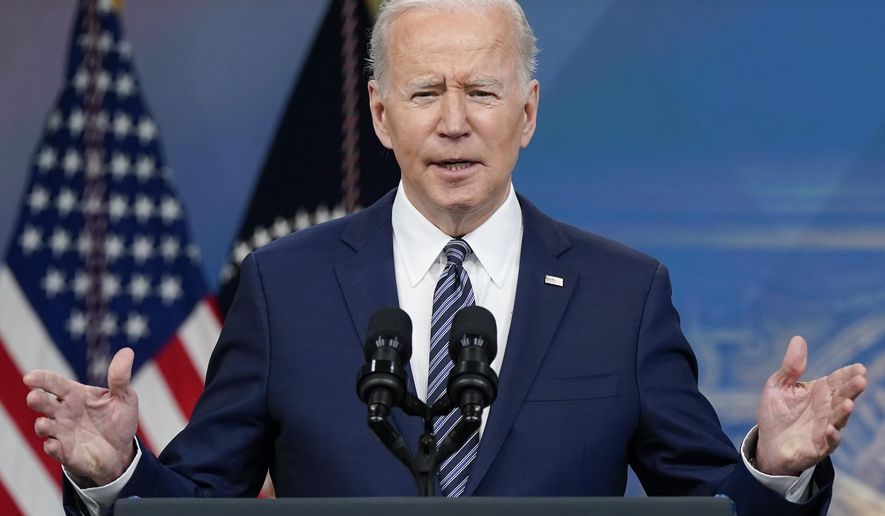President Biden’s announcement Thursday that the U.S. will release nearly 200 million barrels of oil from the Strategic Petroleum Reserve over the next several months was met with skepticism from Republicans, energy experts and even some in his own party.
Both allies and foes were unsure that the planned release from the stockpile of a million barrels a day — about 5% of the 20 million used daily in the U.S. — for the next six months will have any impact on record-high gas prices.
Mr. Biden defended his decision.
“This is a wartime bridge to increase oil supply until production ramps up later this year,” Mr. Biden said. “I’m going to continue to use every tool at my disposal to protect you from Putin’s price hike. It’s not the time for politics. Americans can’t afford that right now.”
The move to dip into reserves typically tapped only during emergencies, such as natural disasters, as a mechanism to lower prices underscores the political pressure on the president.
The midterms are just months away and polls this month have left Mr. Biden and Democrats worried about a voter backlash.
“High gas prices are a political nightmare. Democrats are staring at the midterms,” longtime oil markets analyst Dan Dicker said in an interview. “It can drive prices down. How much? My guess is not a whole bunch. It won’t fundamentally make a difference in demand. In the short period, it can scare the bejesus out of traders.”
As of Thursday afternoon, oil markets were down. WTI crude, the U.S. benchmark, was down nearly $7 per barrel to roughly $101 and Brent crude, the global benchmark, was down about $5.50 to around $108. The national average for a regular gallon of gas was $4.23, down one penny from a week ago and up $1.36 from one year ago.
Mr. Biden characterized his move as yet another way to continue waging economic war against Russia for its invasion of Ukraine by adding to the global supply of oil.
He said the U.S. is urging other countries to release more oil from their reserves.
Patrick De Haan, founder of the fuel-price tracking service GasBuddy, expressed concern over depleting U.S. reserves from the 568 million barrels on hand to 388 million, which would be the lowest level since 1984, according to the U.S. Energy Information Administration.
The Biden release, as planned, would also constitute the largest ever drawdown of the reserve.
“The [Strategic Petroleum Reserve] is not the strategic price reserve and should not be used [in my opinion] unless it is absolutely necessary, though the consumer side of me prefers lower #gasprices,” Mr. De Haan wrote in a series of tweets. “I just think we ought to be careful.”
Most Democrats praised Mr. Biden for not only the release of oil but also a new provision that would create a use-it-lost-it type policy that charges oil companies fees for unused drilling permits on public lands and in waters.
However, some members of the president’s party, which has long accused Big Oil of price gouging drivers at the pump, expressed a degree of doubt that savings would be passed along to consumers by energy companies amid record profits.
“We would hope that there would be some relationship between the price of oil coming down, the president releasing one million [barrels] per day for the next six months [and] increasing supply,” House Speaker Nancy Pelosi, California Democrat, told reporters. “Supply usually lowers cost. We’ll just see how that is reflected.”
Sen. Martin Heinrich, New Mexico Democrat, cited concern over the common phenomenon known as “rockets and feathers” that describes how gas prices shoot up like a rocket with rising energy costs but then fall like a feather, despite drops in oil prices.
“I think it will certainly create the space to lower gas prices. We’ll have to see if they choose to do that or if they pass those margins along to their shareholders,” Mr. Heinrich said.
The latest release of oil will mark the third time in recent months that Mr. Biden has dipped into the strategic reserves. He released 50 million barrels in November as energy prices began to rise sharply and another 30 million earlier this month following Moscow’s war against Ukraine and the U.S. banning Russian energy imports, both actions that skyrocketed prices.
As they did both times in the past, Republicans chalked up the latest release as a “political gimmick.”
“Whether it’s gas, whether it’s groceries, whether it’s critical things people need at home, you’re now at a 40-year high for inflation. These are very sharp increases,” said Sen. John Barrasso, Wyoming Republican and ranking member of the Senate Energy Committee. “The president is desperate.”
The American Petroleum Institute, a lobbying firm for the oil and natural gas industry, said that while Mr. Biden’s action “may provide some short-term relief, it is far from a long-term solution.”
“The “best thing the White House can do right now is to remove barriers to investment in American energy production and infrastructure,” API President and CEO Mike Sommers said.
• Ramsey Touchberry can be reached at rtouchberry@washingtontimes.com.




Please read our comment policy before commenting.